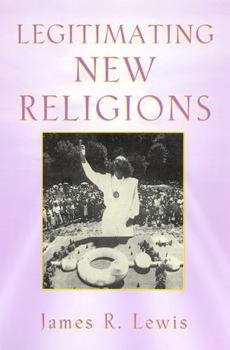Legitimating New Religions
Select Format
Select Condition 
Book Overview
James R. Lewis has written the first book to deal explicitly with the issue of how emerging religions legitimate themselves. He contends that a new religion has at least four different, though overlapping, areas where legitimacy is a concern: making converts, maintaining followers, shaping public opinion, and appeasing government authorities. The legitimacy that new religions seek in the public realm is primarily that of social acceptance. Mainstream...
Format:Paperback
Language:English
ISBN:0813533244
ISBN13:9780813533247
Release Date:November 2003
Publisher:Rutgers University Press
Length:272 Pages
Weight:0.88 lbs.
Dimensions:0.7" x 6.0" x 9.2"
Customer Reviews
1 rating
Interesting, compelling, informative.
Published by Thriftbooks.com User , 21 years ago
I really enjoyed this book. For anyone who is interested in the sociology of religion or new religious movements, this will be a nice read. I loved the introduction, when the author talks about his own experiences with charisma, in this instance, with Elizabeth C. Prophet of C.U.T. The author covers a wide and interesting array of new religious movements, from Native American movements to the Church of Satan, from Heaven's Gate to Scientology. Unfortunately, he doesn't say hardly anything about the legitimation strategies of Mormonism -- one of the fastest growing religions in the world. Speaking of Mormons, I think the example of Joseph Smith would counter and prove wrong Lewis's assertions that "founders of new religions...do not sit down in their living rooms and consciously draw up the contours of their new religious synthesis..." (p.38). [see D. Persuitte's Joseph Smith and the Origins of the Book of Mormon for details.] The strongest element of the book is to argue against the whole "cult"/"brainwashing" line of thinking. Lewis soundly argues that new religious movements are just as "normal" (or whacky!) as legitimate religions, and that there is simply no justification in labelling some religious movements as "cults." Brainwashing, as Lewis, discusses, is a myth. In his conclusion, Lewis argues that scholars of religion should never "dispute the truth of other people's religious claims, even when participants believe such claims to be true in a literal, scientific sense." (p.227). Of course, he doesn't say why this need be the case. Is it just because to do so would be impolite? rude? Threaten the cosmos of the religous? -- So what? I don't think people seriosuly studying religion should have to worry about upsetting the feelings of their subjects. Such restraint would mean scholars could never do anything but describe. The ultimate goal of social science is to explain. Truth claims can and must be be debunked by social scientists no matter who makes them, be they communists, capitalists, anti-abortionists, environmentalists, or the religious. Lewis himself de-bunks numerous beliefs in his own book, for instance, when looking at Jesus in India beliefs as well as Satanism. He uses words like "forged document," "forgery," and "fabrication," numerous times. Why is it OK to use these words when discussingThe Life of Saint Issa, but not the New Testament? Why can Lewis call the work of Gerald Gardner forged, but forbid other scholars from saying the same thing about The Book of Mormon or the writings of Ellen G. White? Lewis is a sensitive, careful scholar and has contributed much to our understand of new religious movements. This book continues to illuminate.






